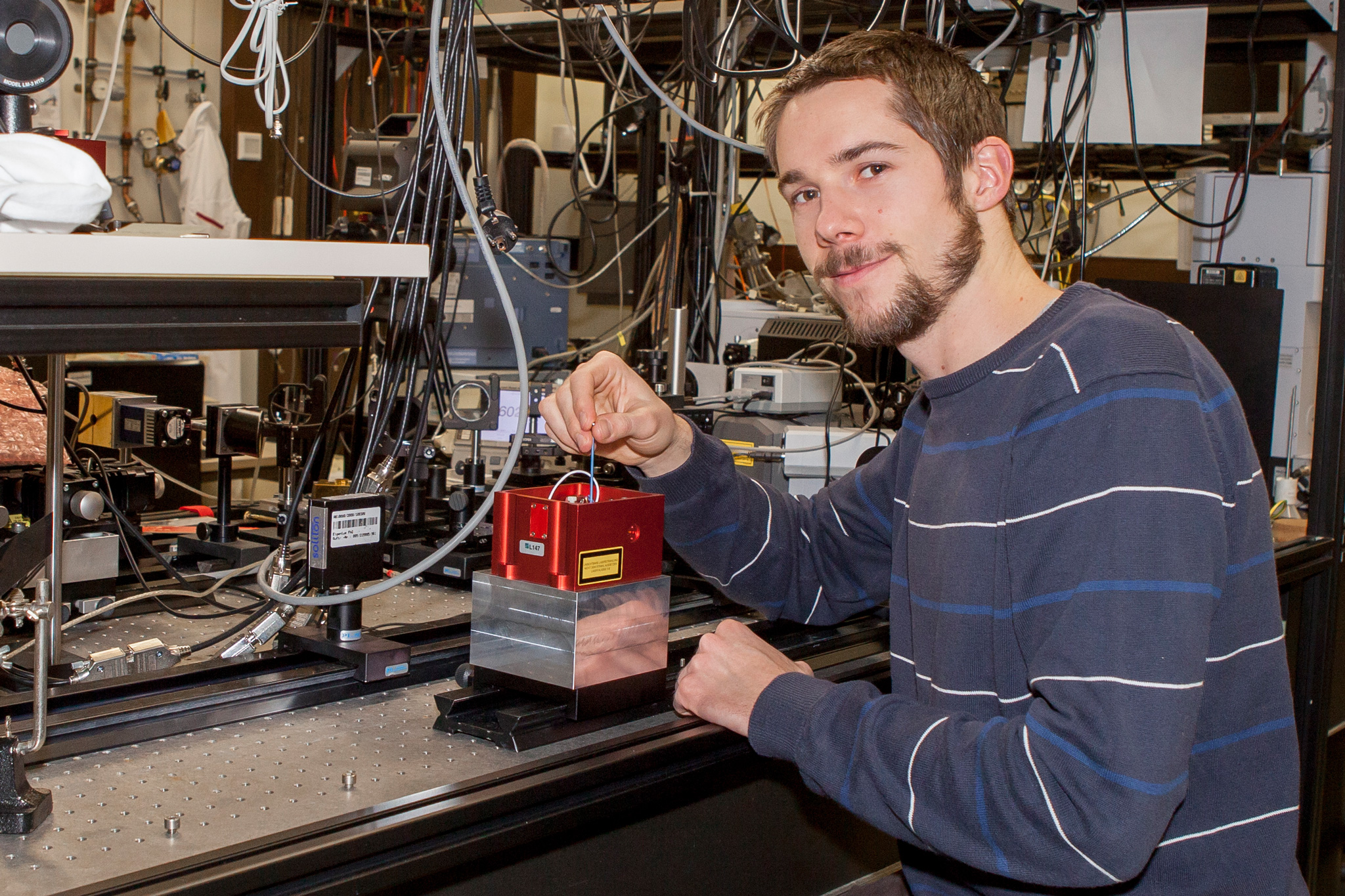
Quantum cascade lasers open up optimized procedures for infrared spectroscopy. They are, amongst others, able to detect hazardous substances and to remarkably improve medical analysis. Lorenz Butschek, a PhD student at Fraunhofer IAF in Freiburg, sees great potential in the field of laser technology. He describes in our interview, how his work combines highly complex quantum physics with application-oriented research.
In January 2015, Lorenz Butschek (26) joined the team of Fraunhofer IAF as a PhD student in the business unit of semiconductor lasers. Before, he completed his master’s degree in Innsbruck, Austria, in the field of experimental quantum physics. His motivation for a scientific career is to help shaping the current laser research through his work at Fraunhofer IAF.
What task are you researching on for your PhD project?
Essentially, my work aims at analyzing the behavior of quantum cascade lasers (QCLs) in external resonators. Concretely, we want to know how stable the lasers run regarding intensity and emission wavelength, as the precision and reliability of spectroscopic measurements are influenced by the noise characteristics of the laser source. QCLs as spectroscopic measuring instruments enable completely new perspectives for faster, contact-free and very precise identification of various substances –liquid, solid and even gaseous.
Where do you see the advantage of Lasers for precise measurements?
Compared to classical light sources lasers have a very high spectral intensity. One laser beam of only a few milliwatts concentrates much more power in a small wavelength range than a classical, broadband emitting light source. In addition, the emission wavelength of a QCL can be tuned by feeding back that part of the output spectrum. With these characteristics lasers allow very precise measurements and identification of specific absorption bands and thus offer great advantages for spectroscopic applications.
How did you find your PhD topic?
During my masters’ program I did a lot of research on the fundamentals of quantum physics. I now wanted to set a stronger focus on specific applications. Considering my background, laser physics suggests itself as a possible field of research. It combines quantum physics and the proximity to application – much more as, for example, the very fundamental research on quantum computers.
And what makes the laser-topic so interesting for you?
The topic of quantum cascade lasers is still relatively new to applied science – that makes the work in this research field fascinating and exciting... Especially in the area of mid-infrared spectroscopy there are a lot of fields of application which have not yet been sufficiently analyzed, or where further development of QCL technology is necessary. At this stage, an idea for improvements of certain features of a QCL source can have quite an impact on the research landscape. I couldn’t think of a better motivation for my PhD!
Why did you decide on Fraunhofer IAF?
I always found the Fraunhofer-Gesellschaft very appealing because it acts as an interface between university research and industry. In my targeted search for PhD programs at Fraunhofer, I luckily found a position dealing with exactly what I was looking for –laser technology. Plus it was in the beautiful city of Freiburg.
What motivates you for the work in research at Fraunhofer?
What I like best about my work at Fraunhofer IAF is the application-oriented research. Through the close cooperation with industry partners, I can implement my findings in practice within a relatively short time. This has always fascinated me about the Fraunhofer-Gesellschaft.
Which aspects persuaded you to do a PhD?
My wish for the future would be to take on a leading position in research – for example in a development department. In my opinion, the PhD title, but also the experience of working on the project, is very helpful. In addition, I have great interest in doing research in the area of the quantum physics. A PhD is the best setting to get started.
What has been your highlight at IAF so far?
That would be my first gas-spectroscopy using a QCL, which in reality worked better than I expected. With a pretty simple experimental setup we were able to measure the absorption bands of carbon monoxide with much more sensitivity than we had thought, allowing us to identify traces of the gas.
How would you describe Fraunhofer IAF in three words?
Multifaceted – dynamic – organized
Would you tell us your favourite spot in Freiburg?
The river Dreisam. What I like about Freiburg in general is that it doesn’t take long to be out in the green.
 Fraunhofer Institute for Applied Solid State Physics IAF
Fraunhofer Institute for Applied Solid State Physics IAF